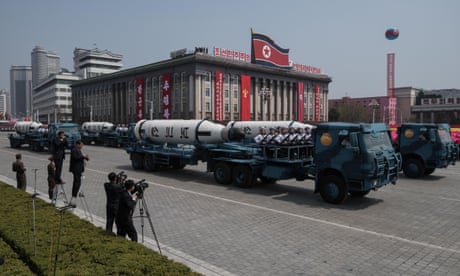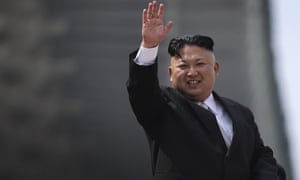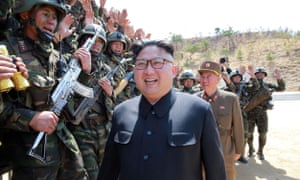Strategy of sending in the US navy and attacking Syria and Afghanistan likely only to boost Pyongyang’s nuclear resolve
Donald Trump’s approach to North Korean leader Kim Jong-un appears to have made the leader only more determined in his nuclear ambitions. Photograph: Wong Maye-E/AP
Tom Phillips in Beijing and Justin McCurry in Tokyo
In the lead-up to North Korea’s latest missile test, Donald Trump had battled to convince Kim Jong-un he was picking a fight with the wrong guy.
The US president pounded Syria with 59 Tomahawk missiles and then ordered a naval “armada” into the waters around the Korean peninsula. He dropped the “mother of all bombs” on eastern Afghanistan and used Twitter to hammer home his message.
Tom Phillips in Beijing and Justin McCurry in Tokyo
In the lead-up to North Korea’s latest missile test, Donald Trump had battled to convince Kim Jong-un he was picking a fight with the wrong guy.
The US president pounded Syria with 59 Tomahawk missiles and then ordered a naval “armada” into the waters around the Korean peninsula. He dropped the “mother of all bombs” on eastern Afghanistan and used Twitter to hammer home his message.

“North Korea is looking for trouble,” the US president tweeted last week as Kim’s technicians made the final preparations for Sunday’s botched but nevertheless defiant test.
But experts say Pyongyang’s latest act has underlined the futility of the billionaire’s efforts to bully Kim Jong-un into abandoning his nuclear ambitions.
“There is a problem with playing the military threat [card] with North Korea because they are inclined to call the bluff,” said John Delury, a North Korea expert from Yonsei University in Seoul. “I’m not saying they tested because of the threats. But bringing a naval strike group doesn’t help if your goal is to put off a test. If anything you are increasing the odds.”
Trump supporters claim his apparent strategy of using spectacular shows of military might to cow the North Korean dictator and convince the Chinese president, Xi Jinping, to crack down on his ally is paying off.
“Displays of American power matter. A lot,” Daniel Blumenthal, a China specialist from the American Enterprise Institute, a conservative thinktank, argued on Twitter, describing the strikes on Syria and Afghanistan as “very much messages to Xi and Kim”.
FacebookTwitterPinterest North Korean leader Kim Jong-un inspects his troops at an undisclosed location. Photograph: STR/AFP/Getty Images
Some observers point to a recent editorial in a Communist party-controlled newspaper, the Global Times, as proof that Trump has finally convinced Beijing to rein in Kim Jong-un by dramatically tightening sanctions.
Delury, however, said there was no evidence to suggest Xi was prepared to do anything more than “increase some sanctions here and there”. “The Global Times can write all the editorials it wants but China’s approach on this is consistent”. Beijing’s message to Trump was crystal clear, he said: “Cool down.”
In fact, Delury claimed Trump’s sabre-rattling rhetoric and erratic use of force would only strengthen Kim’s determination to develop an effective nuclear deterrent that might spare him the fate of Saddam Hussein or Muammar Gaddafi.
“It’s really just playing Pyongyang’s game. It is a waste of time and the Trump administration should move onto a more promising avenue to solve the problem ... Since they have nothing to lose and we have everything to lose, they win every game of chicken.”
The message is that despite US posturing they are not going to abandon their missile programmeLeonid Petrov, Australian National University
Leonid Petrov, a North Korea specialist at the Australian National University, said that with its latest missile launch “the message from North Korea is that despite US posturing they are not going to abandon their missile programme”.
Petrov said he was not surprised Kim Jong-un had chosen not to commemorate the 105th anniversary of the birth of the founder of North Korea, his grandfather Kim Il-sung, with an anticipated sixth nuclear test.
“Given the physical damage that would cause to nearby areas, it would have been unusual for a loyal, filial grandson to order a nuclear test on such an auspicious day,” he said.
But when that test does come it would prove the day of reckoning for Trump’s more aggressive approach towards North Korea. “If the US responds with an attack, that would confirm Kim’s claims that he is surrounded by hostile forces that are determined to carry out a pre-emptive strike,” Petrov said.
“The moment of truth for the US will be whether it strikes [in response to a nuclear test] and provokes a resumption of the Korean war at the expense of South Korean security, or stands down and betrays its weakness.”
“What would the US do? Withdraw, hang around or strike?” Petrov asked. “The ball is in the Americans’ court.”
Some observers point to a recent editorial in a Communist party-controlled newspaper, the Global Times, as proof that Trump has finally convinced Beijing to rein in Kim Jong-un by dramatically tightening sanctions.
Delury, however, said there was no evidence to suggest Xi was prepared to do anything more than “increase some sanctions here and there”. “The Global Times can write all the editorials it wants but China’s approach on this is consistent”. Beijing’s message to Trump was crystal clear, he said: “Cool down.”
In fact, Delury claimed Trump’s sabre-rattling rhetoric and erratic use of force would only strengthen Kim’s determination to develop an effective nuclear deterrent that might spare him the fate of Saddam Hussein or Muammar Gaddafi.
“It’s really just playing Pyongyang’s game. It is a waste of time and the Trump administration should move onto a more promising avenue to solve the problem ... Since they have nothing to lose and we have everything to lose, they win every game of chicken.”
The message is that despite US posturing they are not going to abandon their missile programmeLeonid Petrov, Australian National University
Leonid Petrov, a North Korea specialist at the Australian National University, said that with its latest missile launch “the message from North Korea is that despite US posturing they are not going to abandon their missile programme”.
Petrov said he was not surprised Kim Jong-un had chosen not to commemorate the 105th anniversary of the birth of the founder of North Korea, his grandfather Kim Il-sung, with an anticipated sixth nuclear test.
“Given the physical damage that would cause to nearby areas, it would have been unusual for a loyal, filial grandson to order a nuclear test on such an auspicious day,” he said.
But when that test does come it would prove the day of reckoning for Trump’s more aggressive approach towards North Korea. “If the US responds with an attack, that would confirm Kim’s claims that he is surrounded by hostile forces that are determined to carry out a pre-emptive strike,” Petrov said.
“The moment of truth for the US will be whether it strikes [in response to a nuclear test] and provokes a resumption of the Korean war at the expense of South Korean security, or stands down and betrays its weakness.”
“What would the US do? Withdraw, hang around or strike?” Petrov asked. “The ball is in the Americans’ court.”


Comments
Post a Comment